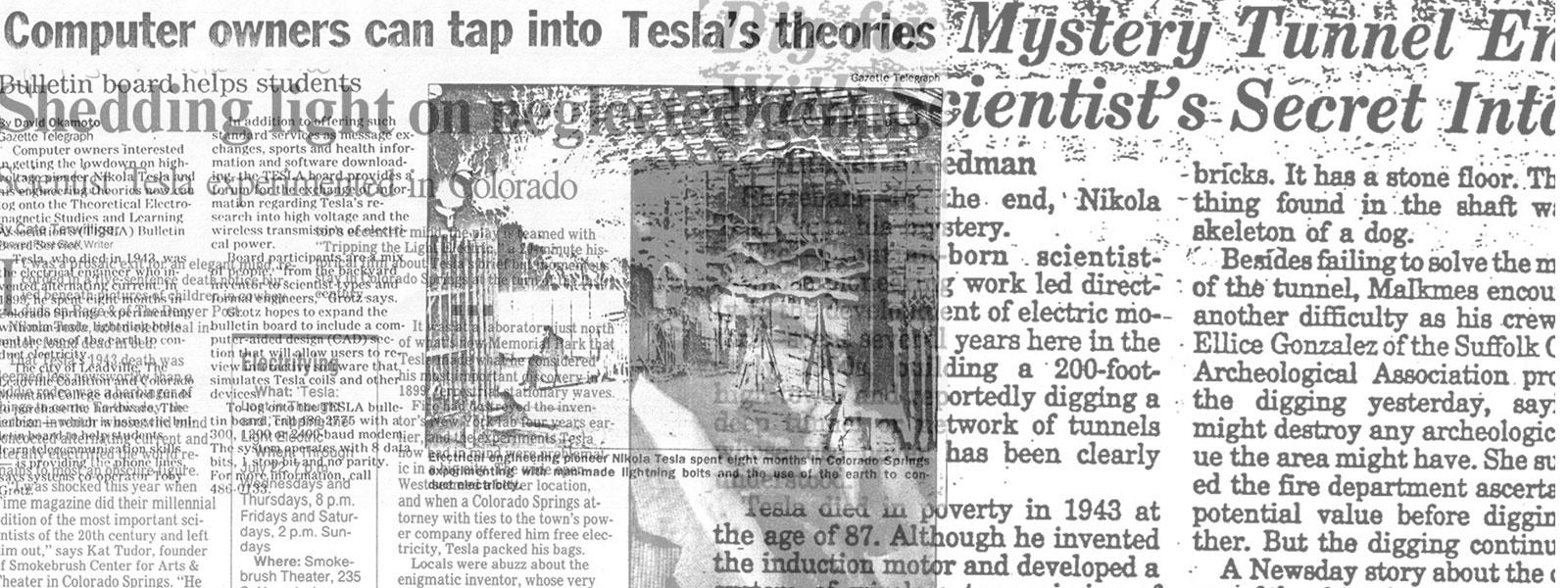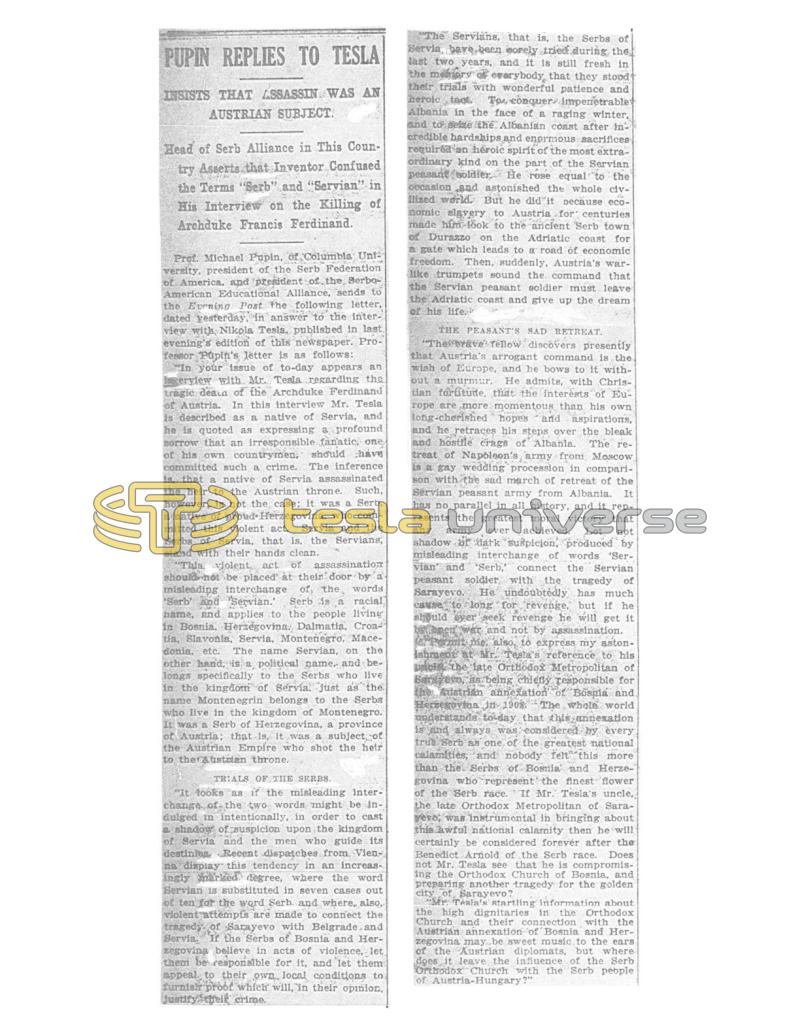
Nikola Tesla Articles
Pupin Replies to Tesla
Insists that Assasin Was an Austrian Subject
Head of Serb Alliance in This Country Asserts that Inventor Confused the Terms "Serb" and "Servian" in His Interview on the Killing of Archduke Francis Ferdinand.
Prof. Michael Pupin, of Columbia University, president of the Serb Federation of America, and president of the Serbo-American Educational Alliance, sends to the Evening Post the following letter, dated yesterday, in answer to the interview with Nikola Tesla, published in last evening's edition of this newspaper. Professor Pupin's letter is as follows:
"In your issue of to-day appears an interview with Mr. Tesla regarding the tragic death of the Archduke Ferdinand of Austria. In this interview Mr. Tesla is described as a native of Servia, and he is quoted as expressing a profound sorrow that an irresponsible fanatic, one of his own countrymen, should have committed such a crime. The inference is, that a native of Servia assassinated the heir to the Austrian throne. Such, however, is not the case; it was a Serb, a native of proud Herzegovina, who committed this violent act. Servia and the Serbs of Servia, that is, the Servians, stand with their hands clean.
"This, violent, act of assassination should not be placed at their door by a misleading interchange of the words ‘Serb' and ‘Servian.' Serb is a racial name, and applies to the people living in Bosnia, Herzegovina, Dalmatia, Croatia, Slavonia, Servia, Montenegro, Macedonia, etc. The name Servian, on the other hand, is a political name, and belongs specifically to the Serbs who live in the kingdom of Servia, just as the name Montenegrin belongs to the Serbs who live in the kingdom of Montenegro. It was a Serb of Herzegovina, a province of Austria; that is, it was a subject of the Austrian Empire who shot the heir to the Austrian throne.
Trials of the Serbs
"It looks as if the misleading interchange of the two words might be indulged in intentionally, in order to cast a shadow of suspicion upon the kingdom of Servia and the men who guide its destinies. Recent dispatches from Vienna display this tendency in an increasingly marked degree, where the word Servian is substituted in seven cases out of ten for the word Serb, and where, also, violent attempts are made to connect the tragedy of Sarayevo with Belgrade and Servia. If the Serbs of Bosnia and Herzegovina believe in acts of violence, let them be responsible for it, and let them appeal to their own, local conditions to furnish proof which will, in their opinion, justify their crime.
"The Servians, that is, the Serbs of Servia, have been sorely tried during the last two years, and it is still fresh in the memory of everybody that they stood their trials with wonderful patience and heroic tact. To conquer impenetrable Albania in the face of a raging winter, and to see the Albanian coast after incredible hardships and enormous sacrifices required an heroic spirit of the most extraordinary kind on the part of the Servian peasant soldier. He rose equal to the occasion astonished the whole civilized world. But he did'it because economic slavery to Austria for centuries made him look to the ancient Serb town of Durazzo on the Adriatic coast for a gate which leads to a road of economic freedom. Then, suddenly, Austria's warlike trumpets sound the command that the Servian peasant soldier must leave the Adriatic coast and give up the dream of his life.
The Peasant's Sad Retreat
"The brave fellow discovers presently that Austria's arrogant command is the wish of Europe, and he bows to it without a murmur. He admits, with Christian fortitude, that the interests of Europe are more momentous than his own long-cherished hopes and aspirations, and he retraces his steps over the bleak and hostile crags of Albania. The retreat of Napoleon's army from Moscow is a gay wedding procession in comparison with the sad march of retreat of the Servian peasant army from Albania. It has no parallel in all history, and it represents the greatest moral victory that any army ever achieved. Let not shadow of dark suspicion, produced by misleading interchange of words ‘Servian' and ‘Serb,' connect the Servian peasant soldier with the tragedy of Sarayevo. He undoubtedly has much cause to long for revenge, but if he should ever seek revenge he will get it in open war and not by assassination.
"Permit me, also to express my astonishment at Mr. Tesla's reference to his uncle, the late Orthodox Metropolitan of Sarayevo, as being chiefly responsible for the Austrian annexation of Bosnia and Herzegovina in 1908. The whole world understands to-day that this annexation is and always was considered by every true Serb as one of the greatest national calamities, and nobody felt this more than the Serbs of Bosnia and Herzegovina who represent the finest flower of the Serb race. If Mr. Tesla's uncle, the late Orthodox Metropolitan of Sarajevo; was instrumental in bringing about this awful national calamity then he will certainly be considered forever after the Benedict Arnold of the Serb race. Does not Mr. Tesla see that he is compromising the Orthodox Church of Bosnia, and preparing another tragedy for the golden city of Sarayevo?
"Mr. Tesla's startling information about the high dignitaries in the Orthodox Church and their connection with the Austrian annexation of Bosnia and Herzegovina may be sweet music to the ears of the Austrian diplomats, but where does it leave the influence of the Serb Orthodox Church with the Serb people of Austria-Hungary?"
